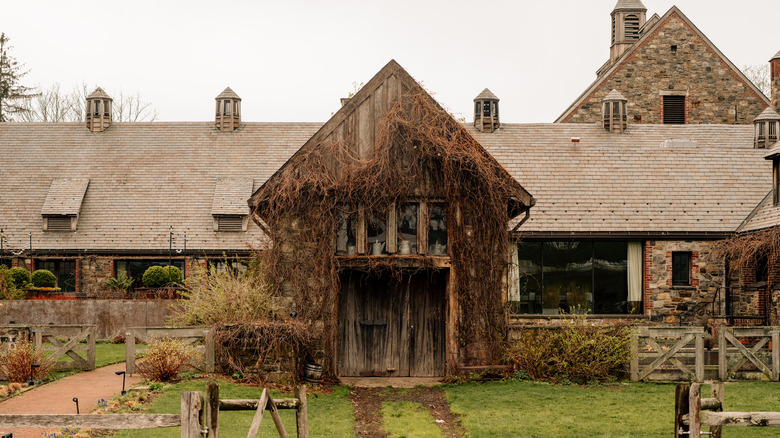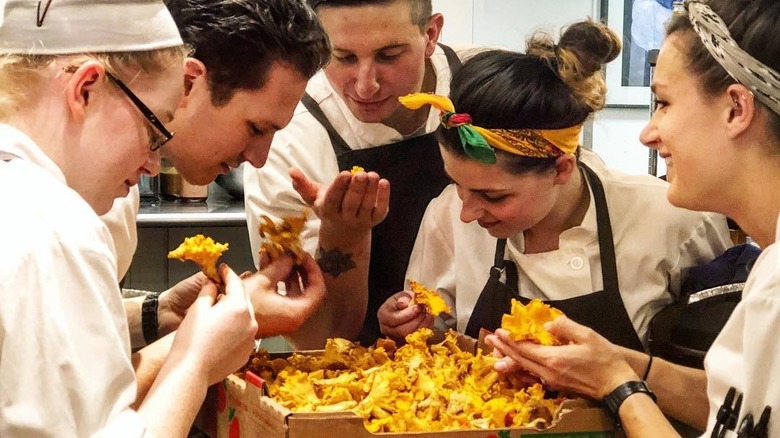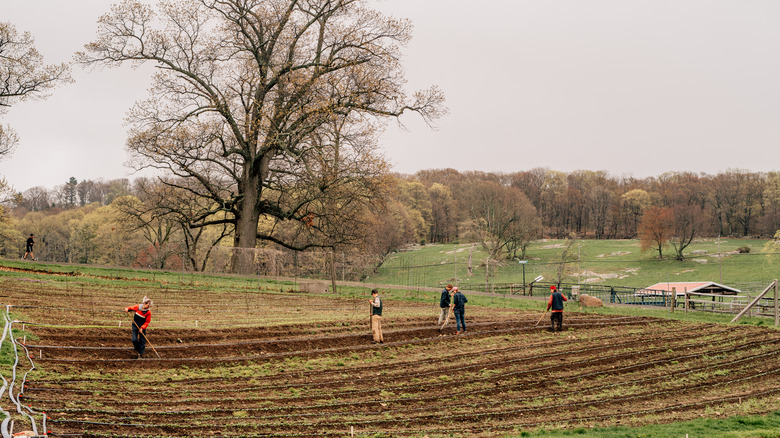Why Former Blue Hill At Stone Barns Employees Are Speaking Out
One of the nation's most celebrated chefs has come under fire this week after a scathing Eater report levied serious allegations of worker mistreatment at Chef Dan Barber and his famed Hudson Valley Eatery.
In 2000, Chef Barber — who previously worked at the esteemed Chez Panisse and Campanile restaurants, after receiving culinary training in France — opened Blue Hill restaurant in New York City, an upscale eatery serving locally sourced farm-to-table meals. After David Rockefeller (of the high-society family) dined at the restaurant in 2001, he propositioned the restaurateur to open a second location on a Rockefeller-owned plot of land (called Stone Barns) just north of the city in Pocantico Hills, New York (via Forbes).
Barber took Rockefeller up on his offer, opening Blue Hill at Stone Barns in a converted barn on the property in 2004. Since its inception, the restaurant has shared the land with the Stone Barns Center for Food and Agriculture, a nonprofit educational organization that operates the on-site farm.
In the years since, the sustainably-minded restaurant has collected countless culinary accolades, including a James Beard Award for Outstanding Restaurant in 2015, and was ranked the 11th best restaurant in the world by World's 50 Best in 2017 (since then, the farm-to-table restaurant has slipped to #74 on the current World's 50 Best list).
Despite the fine dining price tag, workers were paid minimum wage
In 2020, the restaurant was awarded 2 Michelin stars, securing its place among an elite group of just 36 American restaurants to receive the 2-star designation (via USA Today). Barber also received one of the Michelin Guide's first Green Stars, awarded to chefs who have excelled in sustainable practices (via Vogue).
However, while the view of Blue Hill from the outside was that of a bucolic restaurant serving innovative dishes on a sustainably farmed plot of land, former employees of Blue Hill at Stones Barn and The Stone Barns Center say that working conditions were far from idyllic.
A two-part investigatory Eater report, compiled from the accounts of dozens of kitchen, front-of-house, and farm employees from across the Stone Barns operation, depicts a toxic restaurant atmosphere that fostered the mistreatment of workers while allegedly misleading customers about some of the eatery's practices.
Numerous former Blue Hill employees allege that Barber and his management team cultivated a mentally and physically exhausting working environment, in which cooks, servers, and other restaurant workers were underpaid to work long, brutal hours under a head chef prone to explosions of anger. Despite previously charging an eye-popping $258+ per person for the restaurant's tasting menu, Blue Hill paid many of its employees minimum wage to work grueling 70-hour weeks.
Customers were occasionally misled about ingredient sources
In 2017, service employees filed a $2 million wage theft lawsuit against the company, which continued to pay employees a $12 minimum wage even after NYC raised the minimum to $15 in 2018 (via Eater). According to the restaurant, it now adheres to a $15 minimum wage at both locations.
In addition to underpayment, allegations in the explosive report include the mishandling of one employee's sexual assault allegation against a member of management, leadership frequently yelling at and humiliating employees over small kitchen mistakes, and frequent outbursts of anger from Barber, who in 2010 publicly described himself as an "angry cook" who is "a little bit abusive" to his staff (via Grubstreet).
In a statement to Eater, representatives for Barber noted that the chef, who "was trained in old-school kitchens under the brigade system, where chefs were unforgiving of even minor mistakes" now "realized that he was not immune to the pressure of the kitchen getting to him and shortening his temper ... [and] recognized that this pressure does not excuse yelling at his team."
Former employees also allege that the restaurant occasionally mislead diners about sourcing and cooking techniques, in order to uphold its local, seasonal, and sustainably-sourced reputation. Cooks report that dishes were occasionally made with ingredients sourced from outside suppliers when local farms didn't supply enough materials — on such occasions, customers were still led to believe that the entire menu was locally sourced.
If you or anyone you know has been a victim of sexual assault, help is available. Visit the Rape, Abuse & Incest National Network website or contact RAINN's National Helpline at 1-800-656-HOPE (4673).
Agricultural workers also reported toxic working conditions
Former employees also stated that due to the complexity of the restaurant's tasting menu, vegan and vegetarian customers were occasionally served ingredients made with animal products — mix-ups that representatives for the restaurant called "rare mistakes" that were "never intentional."
According to Eater, the mistreatment of workers wasn't contained to the restaurant. Former Stone Barns Center for Food & Agriculture employees and apprentices also reported a toxic workplace with similarly low pay, unsafe working conditions, and a "sexist environment" cultivated by an all-male leadership team.
Despite reports of mistreatment across the Stone Barns workforce, many of the restaurant's former employees still voiced gratitude for their time at Stone Barns under Barber's tutelage, citing similar grueling work environments at other fine dining establishments (via Eater). In 2020, Barber announced that he wouldn't be returning to the celebrated restaurant following pandemic closures, unveiling a new quarterly chef-in-residence program that welcomed visiting chefs into the Blue Hill kitchen for rotating seasonal residencies (via Food and Wine).
While it's unclear whether or not working conditions at the famed restaurant have, or will, improve under new kitchen leadership, the growing trend of workers speaking out about toxic culinary workplaces offers a glimmer of hope that the mistreatment of cooks, servers, and other employees across the restaurant industry won't be tolerated in the future (via GQ).



